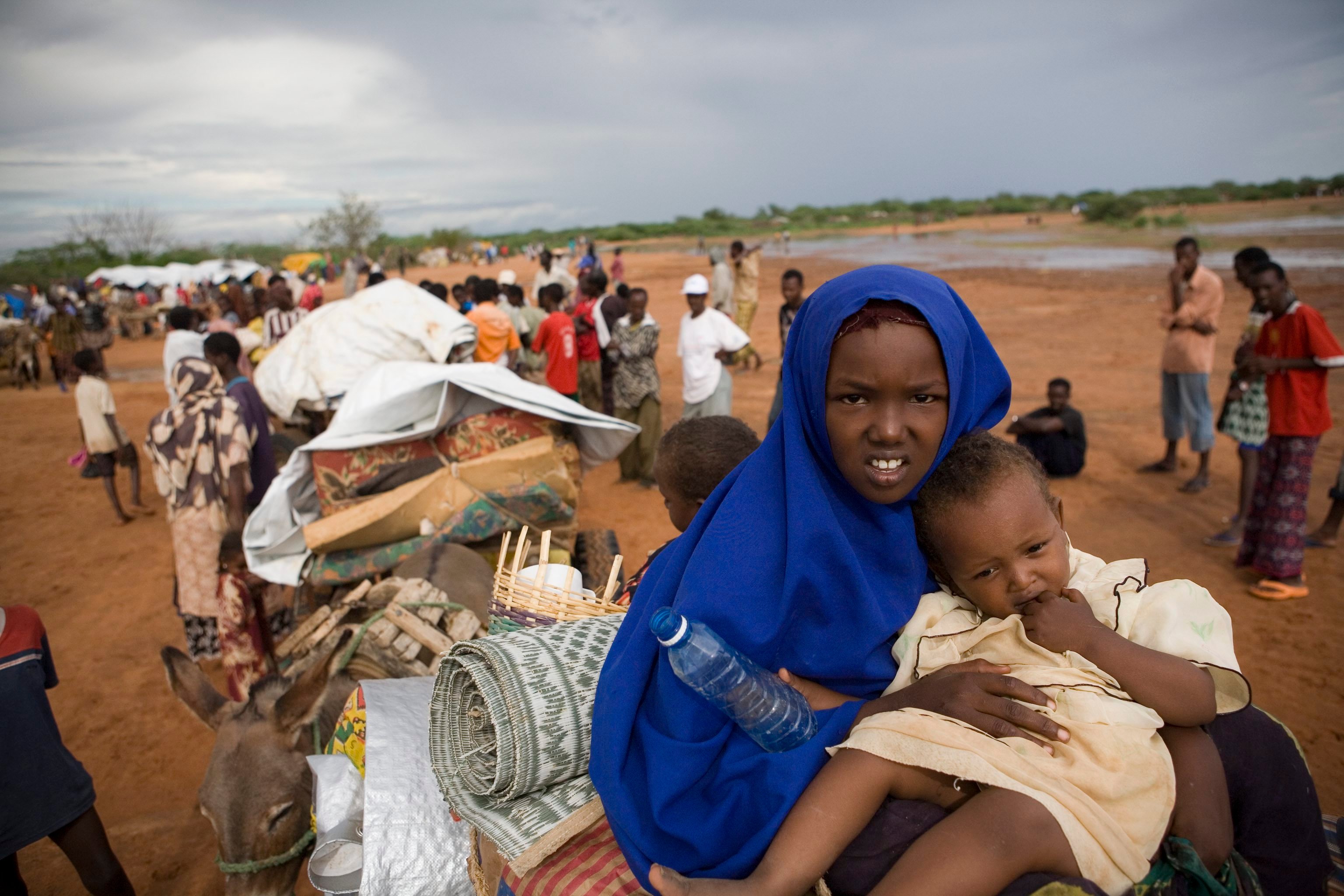UNHCR appeals for $136.3 million as Horn of Africa crisis grows
UNHCR appeals for $136.3 million as Horn of Africa crisis grows

DOLLO ADO, Ethiopia, July 8 (UNHCR) - The UN refugee agency has appealed for $136.3 million to prevent a humanitarian catastrophe amid a growing exodus of Somalis fleeing conflict and drought in their homeland.
The additional funding will help to address the life-saving needs of new Somali arrivals in neighbouring Ethiopia, Djibouti and Kenya.
The UN High Commissioner for Refugees, António Guterres, is in the region to highlight the plight of these new refugees, many of them severely malnourished. On Thursday, he led a small mission to Dollo Ado, a parched and remote area in south-eastern Ethiopia bordering Somalia, where tens of thousands of Somalis have sought refuge in recent months.
Over several hours Guterres and his team toured separate reception and transit areas near Dollo Ado, speaking to refugees and humanitarian workers. They then headed some 60 kilometres westwards along rock-strewn roads to a new refugee camp at Kobe, which was opened just weeks ago but is already nearing its full 20,000-person capacity under the weight of new arrivals.
"2011 has been the year of all crises, but I think that in Somalia we can find the worst humanitarian disaster of this year," Guterres told accompanying journalists. "Our heart is broken when we see mothers telling us that after having walked for days to reach safety, they have lost their children along the way [and] to see children dying and then doctors not being able to help because it is too late."
What Guterres saw during the visit, was telling both about the impact that Somalia's latest crisis is having on its own displaced - now amounting to a quarter of the country's entire population - and about the difficulties that humanitarian organizations are facing in their response.
For the refugees, the stress and exhaustion is plain to see on the faces of new arrivals, who wait in lines to be registered and receive ration cards and other help. Most are from the Bay region to the west of Mogadishu, and some say they have walked for up to 30 days to reach here. "My father is critically ill, but I had to take my six children and leave because of the insecurity," said one woman. "We can't live there." Others spoke of children having died along the way.
For Somalia, already in a state of breakdown from its decades-long conflict, the drought has led to a dramatic new rise in displacement. Food output has fallen, food aid is in short supply, and food prices have consequently increased sharply. Compounding these difficulties has been an offensive by pro-government forces against al-Shabaab insurgents in towns near the Kenya and Ethiopia borders that started in February. Since then the number of refugees arriving here in Dollo Ado has risen with every passing month: Some 54,000 arrivals so far this year, and an average of nearly 1,700 every day for the last few weeks. In short, people have to become refugees to get aid.
Among these recent arrivals in Dollo Ado, malnutrition and mortality rates are alarmingly high. At least 50 per cent of children are either moderately or severely malnourished. Similar rates are being recorded in Kenya.
Meanwhile humanitarian workers and their government counterparts are fast becoming overwhelmed. The sheer numbers of arrivals are outpacing registration capacity; systems for meeting the food and health needs are close to buckling; and electricity for pumping water to camps is in short supply because overcast and dust-laden skies mean solar panels can't cope.
Then there's the problem of space. Kobe refugee camp is the third camp to have opened here so far, but even just weeks old it is approaching its full capacity of 20,000 people. En route to the camp, Guterres' team passed a convoy of several hundred more refugees headed to Kobe, where row upon row of UNHCR tents stretch towards the horizon. Further new camps are clearly needed urgently - and could be provided if international support is forthcoming.
Speaking to journalists who accompanied the visit, Guterres spoke of the need for humanitarian help inside Somalia so that people didn't have to flee across borders simply to survive. Currently, insecurity prevents or limits the degree to which humanitarian actors can work in Somalia. And in Dollo Ado they see the human cost each day - the families who arrive exhausted, the children who perish along the way, seemingly a whole population on the move. "It's a situation that breaks people's hearts," Guterres said.
By Adrian Edwards in Dollo Ado, Ethiopia




